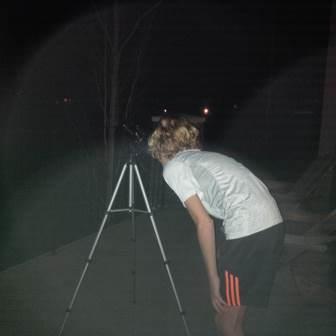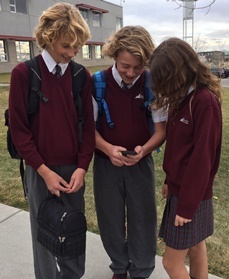It can be quite useful having an astrophysicist for an older brother. Although not easy to follow behind in school growing up (he was 11 when he attended his first University Astronomy course), he was an inspiration -- and today makes the most fascinating Big Bang-style uncle to my 14- and 12-years -old kids. During his last visit, he generated a paradigm shift in their world -- opening up the universe for them and inadvertently showing them that they are in fact, not the center of it. This knowledge left them feeling refreshingly small and insignificant. And it was a good thing.
It happened like this: We drove to the Rockies to attend a star-gazer mecca called the Jasper Dark Sky Festival and listened to Uncle Brian's lecture, then to fellow-lecturer, Canadian astronaut Chris Hadfield's -- and later took the time to gaze up at the night sky in its unpolluted and silent glory. The next day, Uncle Brian gave an introductory astronomy chat at my kids' school which included a two-minute, life-altering video:
Simple but dramatic, the video starts with a photo of our moon, zooms out to larger formations beginning with Earth and then to our sun -- onto Giants and Supergiants -- leaving Earth looking ridiculously small and out of the picture. With each zoom outward the kids erupted in ooohs and ahhhs -- as they recognized, almost in a state of shock, the tiny part they play. Put simply, they witnessed their insignificance.
"Am I that small? Is there really so much more out there, beyond my life, my world?" These are liberating thoughts for kids who largely believe the world revolves around them. Particularly this tech-saturated generation, where the world they know best fits in the palm of their hand -- aka their smartphones.
This knowledge of the big picture, can potentially free them from the infinite "new" growing up pressures of being on and being liked and followed -- along with the traditional troubles of being popular and succeeding at everything -- from school to sports to appearance. I could feel the shift that afternoon in the echoing, sun-lit gymnasium as the kids processed what they had seen -- as they mentally compared their often narrow, selfie-posting, starstruck, YouTube-fame-focused universe to the vast, mysterious real universe they had just viewed.
Introducing this new perspective can be a relief and a comfort to kids. When my kids watched the numbers from that video clip -- announcing that our Sun is just one of several hundred billion stars forming our galaxy, and that there are 100 billion galaxies in the universe -- I could see the wheels turning as they realized that on this new playing field, no one is really noticing if you didn't make the volleyball team, that you didn't get invited to the paintball party, that you bombed the math test. Ups and downs happen, life will go on, and the earth will keep turning as it always has for yes, billions of years. In this me-centric time of their lives, this is what they need: to look up, feel small and feel better.
It's not a free ticket to stop working hard at school, keeping their room tidy or eating properly. But it's a tool to help them find balance. Relativity can be an excellent concept to take the pressure off, keep them grounded and keep their values in check.
If kids have that perspective in their pocket they can draw on it whenever their world seems too demanding or overwhelming. They can zoom out and look up. Look away from their screens and their troubles, their dramas, -- and feel the comfort of their insignificance.
Uncle Brian's Star-Gazing Toolkit:
Start with binoculars such as 7x50 or 8x42 from manufacturers such as Nikon, Orion, Celestron. Cost $100-200
A good beginners telescope is a 6" or 8" reflector telescope on a Dobsonian mount. Most include a couple of eyepieces. Cost $300-$50
For larger budgets try a Celestron NexStar 6SE with a motorized mount and a computer to help find thousands of objects in the sky. Cost $700-800
---
Great Teen level Astronomy books: Nightwatch by Terence Dickinson and Turn Left at Orion by Guy Consolmagno and Dan M. Davis
Great website for space images: Astronomy Picture of the Day
Uncle Brian's (aka Dr. Ventrudo) website

